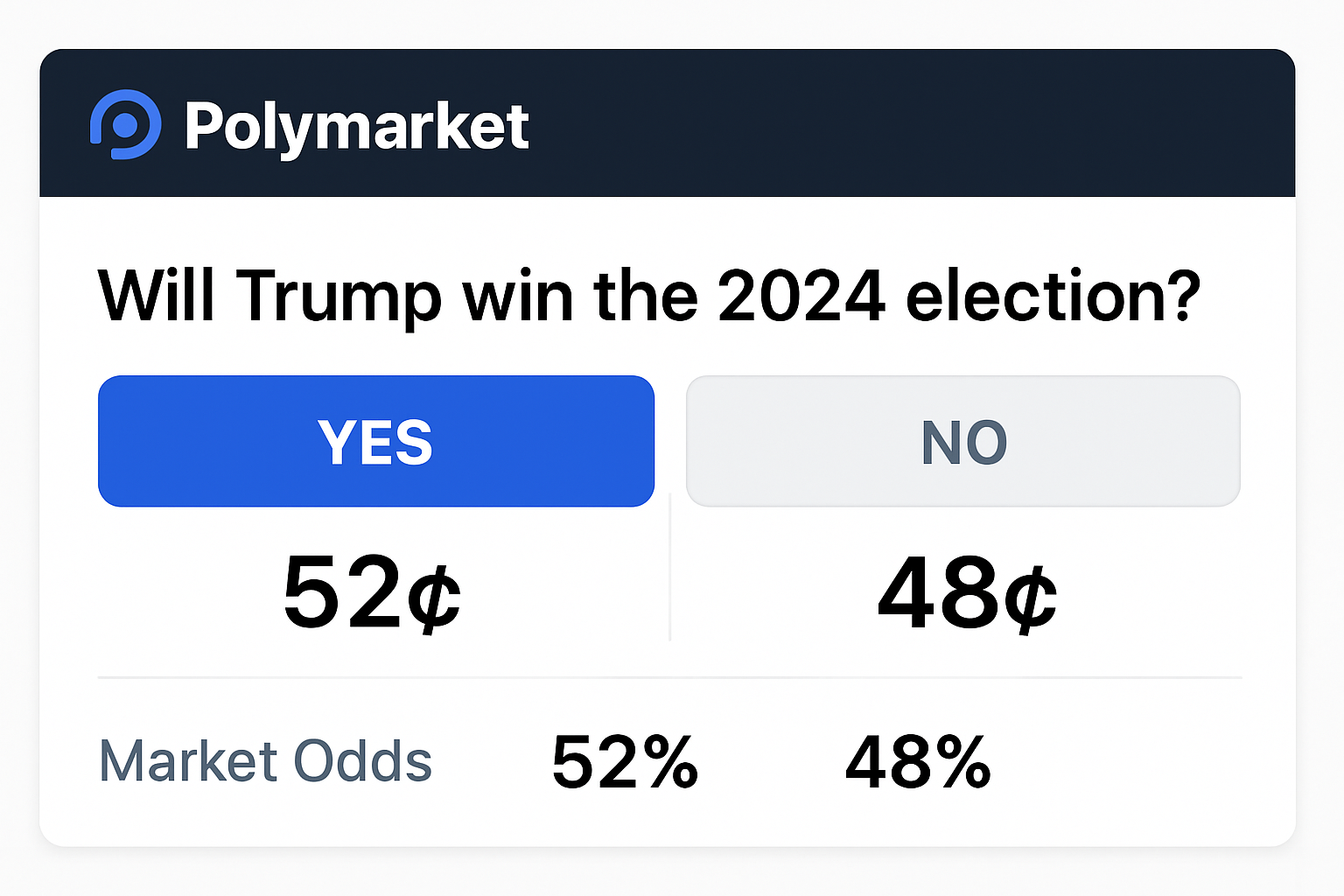How Blockchain is Revolutionizing Sports Betting: Secure and Transparent Prediction Markets

Blockchain isn’t just a buzzword in fintech anymore – it’s the engine powering a seismic shift in the sports betting industry. Traditional sportsbooks, long plagued by opaque odds, slow payouts, and regional restrictions, are rapidly losing ground to decentralized prediction markets that deliver unmatched transparency and security. If you’re a crypto-savvy sports fan or trader hungry for trustless markets, the revolution is already here.

How Blockchain Sports Betting Flips the Script
Let’s get tactical. At its core, blockchain sports betting leverages decentralized ledgers and smart contracts to eliminate the middleman. Every bet, every odds change, every payout – all are immutably recorded on-chain for anyone to audit in real time. This isn’t theoretical: platforms like Polymarket and Augur are already handling billions in volume while giving users unprecedented control over their wagers.
The advantages are clear:
- Transparency: Odds and outcomes are public and verifiable on-chain – no more shadowy backroom calculations.
- Security: Immutable ledgers mean your bet can’t be tampered with after submission.
- Global Access: Forget geo-blocks; anyone with internet and crypto can participate.
- Fast Settlements: Smart contracts auto-execute payouts as soon as results are confirmed.
- Lower Fees: No centralized operator means less rake eating into your winnings.
This is why giants like Intercontinental Exchange (ICE) recently poured $2 billion into Polymarket, and why Robinhood is teaming with Kalshi to bring prediction markets mainstream for NFL and NCAA football fans. The message is clear: institutional money is flowing toward blockchain-powered prediction markets because they solve the pain points of legacy sportsbooks.
The Core Tech: Decentralized Prediction Markets Explained
If you’re new to the concept, prediction markets let users bet on real-world outcomes – from who wins the Super Bowl to whether Bitcoin will hit a certain price by year-end. In decentralized versions, smart contracts handle everything from escrow to settlement automatically. For example, Augur runs on Ethereum and utilizes its REP token for dispute resolution, while Polymarket leverages Polygon’s low fees for rapid trade execution.
This model is catching fire because it blends crowd intelligence with blockchain’s trustless architecture. The result? Odds that reflect true market sentiment rather than bookmaker manipulation. And with every transaction visible on-chain, there’s nowhere for bad actors to hide – making fraud nearly impossible compared to traditional setups.
Pushing Boundaries: Accessibility Without Borders
The old guard of sports betting was notorious for restricting users based on geography or limiting high-volume traders. Blockchain prediction markets obliterate these barriers by operating on public blockchains accessible from anywhere in the world. Whether you’re in Lagos or London, if you have crypto you can bet alongside anyone else – no VPN required, no account shutdowns due to “risk management. ”
This borderless approach is fueling explosive growth across platforms like DexWin and Wagerr as well as established players such as Augur and Kalshi. For a deep dive into how decentralized sportsbooks are disrupting legacy operators with no geo-blocking or limits, check out this detailed breakdown.
The Bottom Line So Far
The numbers don’t lie: with Polymarket valued at $9 billion and institutional investment ramping up fast, blockchain-based sports betting isn’t just a niche experiment anymore – it’s the future of secure, transparent wagering. In the next section we’ll break down how smart contracts automate fair play and instant payouts, plus spotlight some of the most innovative platforms leading this charge.
Smart Contracts: Automating Fair Play and Instant Payouts
Here’s where things get really exciting for anyone who’s ever waited days (or weeks) for a payout from a traditional sportsbook: smart contracts on blockchain sports betting platforms are programmed to execute automatically when predefined conditions are met. As soon as the final whistle blows or the result is confirmed, your winnings (or losses) are settled instantly, no human intervention, no excuses, no delays.
This level of automation slashes operational overhead for platforms while giving bettors confidence that their funds are safe from manipulation or administrative error. The code is the law: if you win, you get paid. If you lose, it’s settled transparently on-chain. Leading protocols like Augur and Polymarket have made these mechanics seamless, with every transaction traceable and auditable by anyone at any time.
This trustless environment is what sets decentralized prediction markets apart from even the slickest Web2 sportsbooks. And it’s not just theory, real-world use cases abound. For instance, Polymarket’s smart contracts on Polygon have handled billions in event volume without a single reported hack or payout dispute. That’s security you can bet on.
Innovation in Action: Platforms Leading the Charge
The ecosystem is evolving at breakneck speed. Here are some standout platforms making waves in crypto sports betting and decentralized prediction markets:
Top Blockchain-Based Sports Prediction Market Platforms
-

Polymarket: The world’s largest decentralized prediction market, Polymarket lets users trade on the outcomes of sports events and more. Powered by the Polygon blockchain, it boasts transparent, on-chain betting and instant settlements. In September 2025, Intercontinental Exchange (ICE) invested up to $2 billion, signaling major institutional trust.
-

Kalshi: As a CFTC-regulated prediction market in the U.S., Kalshi offers legal event contracts, including sports, in all 50 states. Its partnership with Robinhood in August 2025 brought pro and college football prediction markets to a mainstream audience, combining regulatory compliance with blockchain-powered transparency.
-

Augur: Built on Ethereum, Augur is a pioneering decentralized prediction market that allows users to create and trade on sports outcomes using smart contracts. Its unique REP token system ensures community-driven reporting and dispute resolution, with all transactions and odds visible on-chain.
-

DexWin: Focused on sports, DexWin offers a gasless, decentralized sports betting experience with competitive odds and instant bonuses. Its one-step sign-up and immersive interface make it a standout for users seeking seamless blockchain sports wagering.
-

Wagerr: Leveraging its own blockchain, Wagerr delivers decentralized, censorship-resistant sports betting. It uses smart contracts for automatic payouts and boasts global accessibility—no geo-blocking, no limits, and all results verifiable on-chain.
- Polymarket: The world’s largest prediction market by volume, now valued at $9 billion following ICE’s $2 billion investment. Offers fast trading on everything from NFL games to global politics.
- Kalshi: CFTC-regulated and partnered with Robinhood to bring legal event contracts to U. S. users, including pro and college football markets.
- Augur: Ethereum-based pioneer with open-source markets and community-driven reporting via REP tokens.
- DexWin and Wagerr: Focused on immersive user experience, gasless transactions, and best odds for global bettors.
The key takeaway? These aren’t fringe projects, they’re attracting serious capital and millions of users by solving real pain points in the industry. For more on how blockchain ensures transparency in decentralized sports betting, see this comprehensive guide: How Blockchain Ensures Transparency in Decentralized Sports Betting.
What This Means for Bettors
If you’re still using legacy sportsbooks, it’s time to ask yourself why. With blockchain-powered prediction markets offering lower fees, instant settlements, borderless access, and ironclad transparency, all secured by public smart contracts, the old model looks increasingly obsolete. The future belongs to those willing to ride the volatility with eyes wide open and wallets connected to the chain.
The rise of secure sports betting blockchain protocols isn’t just about better tech, it’s about democratizing access to fair odds worldwide.







